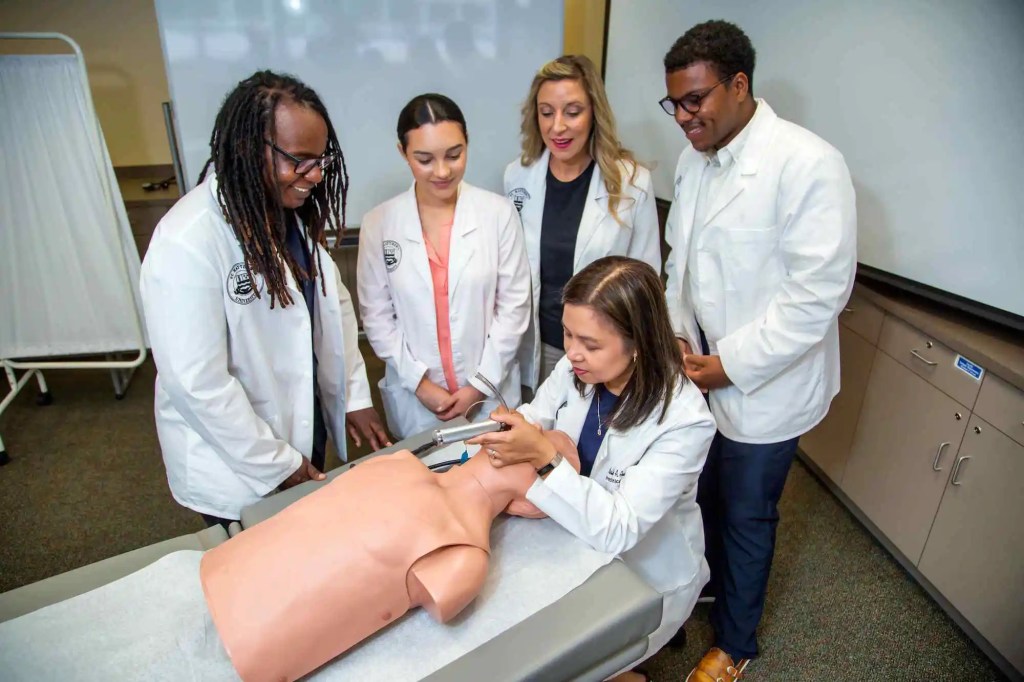
What Is a Medical Fellowship?
Discover the importance of fellowships within the medical education journey.
A fellowship is an optional phase of medical education that helps physicians transition from residency to specialized practice.
During this additional training period, doctors focus on a particular subspecialty within a broader specialty, such as a thoracic surgery fellowship after a general surgery residency. This additional time helps them become experts in a very specific area of human health.
If you are interested in a medical subspecialty that requires fellowship training, read on to learn more about preparing for and navigating this learning period, as well as associated benefits for those who complete fellowship programs.
What Is a Medical Fellowship?
A fellowship is the training that medical school graduates can pursue after completing their residency, which they choose to undertake in order to enhance their expertise in their chosen field of medicine.
During a medical fellowship, the physician (or “fellow”) works closely with a practicing specialist to deepen their experience and knowledge of a particular subspecialty. During training, the fellow may act as a consulting or attending physician.
These training programs are only offered to top residency graduates, and being accepted into a fellowship training program is a high honor and distinction.
What Is the Purpose of a Medical Fellowship?
The purpose of fellowships is to allow physicians to deepen their expertise and expand their treatment skills within a medical subspecialty.
In order to succeed, fellows must be prepared for a fast-paced, intensive period of hands-on training. They are typically given a lot of responsibility early-on, and must quickly develop their aptitude within the field.
After successfully completing a fellowship program, a physician earns the title “fellowship-trained,” which communicates their knowledge and abilities to patients and fellow practitioners. This enhances their career prospects greatly.
What Is the Difference between a Medical Residency and a Fellowship?
Medical residents have earned a medical degree but are not able to practice as independent physicians yet. They are still training during their residency and are not fully licensed. Completing a residency successfully, as well as all required licensing exams within a particular jurisdiction (such as the USMLE in the United States), is what qualifies a physician to practice without supervision.
Fellows have completed a residency and are fully-credentialed physicians who can independently practice medicine. However, they have chosen to undertake further training in a subspecialty to enhance their abilities and expand their career opportunities.
Neither residents nor fellows are financially compensated like independently practicing physicians, although fellows are generally more highly paid than residents. The further into your medical training you go, the more money you usually make.
How Long Is a Medical Fellowship?
The duration of a medical fellowship is typically one to three years, but it will largely depend on the specialty and preceding residency. Fellowship and duration examples:
- Chronic Pain Management (1 year)
- Forensic Psychiatry (1 year)
- Malignant Hematology (1-2 years)
- Medical Oncology (1-2 years)
- Microsurgery and Oncologic Reconstruction (1 year)
- Nuclear Medicine (1-2 years)



How to Get into a Fellowship Program?
Before applying for a fellowship, thoroughly check the program’s medical fellowship requirements to ensure you are eligible and able to develop a successful application. In addition to your medical abilities, you must also demonstrate strong leadership, interpersonal and writing skills, and be highly motivated and self-directed. Highlight these qualities as much as possible.
The application process is extensive and typically includes the following components.
Personal Statement
You’ll usually need to provide a personal statement covering your educational objectives and why you would make a good candidate. Within your statement, talk about what makes you passionate about this particular field of medicine and why you’ve chosen this program. This is where you can add personality to your application and help selection committees understand you as an individual and physician.
Medical Resume
A resume with relevant work experience, education, volunteering, awards and published articles will showcase your abilities and make a compelling case for you to become a fellow. Remember that fellows are hardworking, dedicated doctors who are prepared to go the extra mile, so ensure that’s reflected in your resume.
Letters of Recommendation
Letters of recommendation are formal letters that highlight your skills and commend your professional performance without personal bias. Anyone who directly oversaw your work in medical school, residency or medical work/volunteerism can provide a letter on your behalf.
Interview
Interviews provide a crucial opportunity for you to demonstrate your character and suitability for the program. Your interview is an opportunity to talk about how proactive you are, your problem-solving skills, and what steps you take to diagnose and treat patients. You must show the interviewers that you are knowledgeable, capable and passionate.
What Is the Average Medical Fellowship Salary?
According to salary.com, the average salary for a fellow in the U.S. is $64,700 USD per year, as of September 2025. This can vary substantially depending on the specific field of specialty.
For fellowship-trained physicians who have advanced into independent practice, the financial benefits of their additional training is substantial. According to Physicians Thrive, here are the top 10 average annual salaries for fellowship doctor subspecialties from 2024 (in USD):
- Orthopedics – $558,000
- Plastic Surgery – $536,000
- Cardiology – $525,000
- Urology – $515,000
- Gastroenterology – $512,000
- Radiology – $498,000
- Dermatology – $479,000
- Anesthesiology – $472,000
- Oncology – $464,000
- Otolaryngology – $459,000
Is a Medical Fellowship Worth It?
A medical fellowship program is a commitment that requires time, dedication and financial investment. But it can also provide a fantastic foundation for a successful career in medicine. Explore the benefits and challenges here:
Benefits
- Fellowship-trained doctors are specialists in their field and are highly sought after, and often highly paid.
- Fellowships offer a great learning opportunity, providing hands-on experience and opportunities to work closely with experts in the field.
- Fellowship-trained doctors are highly respected medical professionals and patients are likely to be more trusting of their guidance.
- You’ll have the opportunity to train new fellows in the future.
Challenges
- Competition for fellowships is exceptionally high, so you must have demonstrated success and confidence in your ability.
- Applying to different fellowship programs and participating in funding interviews can be a significant investment of time and money.
- You will need to remain dedicated to your area of specialty for many years.
- There’s considerable pressure for fellowship-trained doctors to perform and succeed.
What Comes After a Fellowship in Medicine?
After completing a medical fellowship, physicians have several career paths to choose from, allowing them to customize their work based on their interests. The main options include:
- Clinical Practice in Hospitals or Clinics: Most physicians work in these settings after fellowship. Their duties will vary based on their subspecialty, but this is the primary career path for many.
- Academic Medicine and Research: Some doctors choose academic settings where they can educate residents and medical students, conduct research and publish medical articles.
- Establishing a Private Practice: Physicians may start their own private practice businesses, requiring both medical knowledge and business management skills.
- Community and Public Health Initiatives: Some pursue public health careers, creating and carrying out initiatives to enhance community health and well-being.
- Roles in the Pharmaceutical and Biotech Industry: Others opt for the pharmaceutical sector, where they may create and evaluate new medications and therapies.
About St. Matthew’s University
No matthew what medical subspecialty you may be considering for after med school and residency, the first step is to earn your Doctor of Medicine degree in an accredited MD program.
At St. Matthew’s University School of Medicine (SMUSOM), we proudly provide the education, early hands-on training and individualized support that future specialists need to succeed. Our graduates earn residencies at high rates and go on to practice in the U.S., Canada and internationally.
To discover more about our learning environment from an alum who went on to pursue fellowships in general and interventional cardiology, check out this testimonial video:
Then get your own journey started by submitting an application, or reach out with any questions you may have!
FAQs About Medical Fellowships
Yes, a doctor can skip a fellowship. A fellowship is optional and is only required for physicians who wish to become sub-specialists (e.g., a cardiologist after an internal medicine residency). Doctors who are satisfied with practicing as a generalist in their core specialty (e.g., general internal medicine, general pediatrics) do not need to complete a fellowship.
Yes, fellows are paid a salary. However, a fellowship salary is generally lower than what a fully practicing specialist in that field would earn. It is typically higher than a resident’s salary, but reflects a fellow’s status as still being in a training position.
A fellow is a doctor (an MD or DO). The term “fellow” specifically denotes their status as a physician undergoing advanced, sub-specialized training after successfully completing med school and residency. After fellowship, they become a fully-qualified physician in their sub-specialty, allowing them to practice independently.
No, not all specialties require a fellowship. Core specialties like Family Medicine, Internal Medicine, Pediatrics and General Surgery allow you to practice after residency. Fellowships are for sub-specialization within these broader fields (e.g., Pediatric Cardiology is a fellowship after residency in Pediatrics).